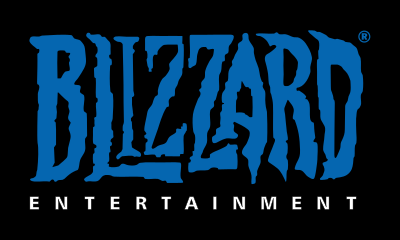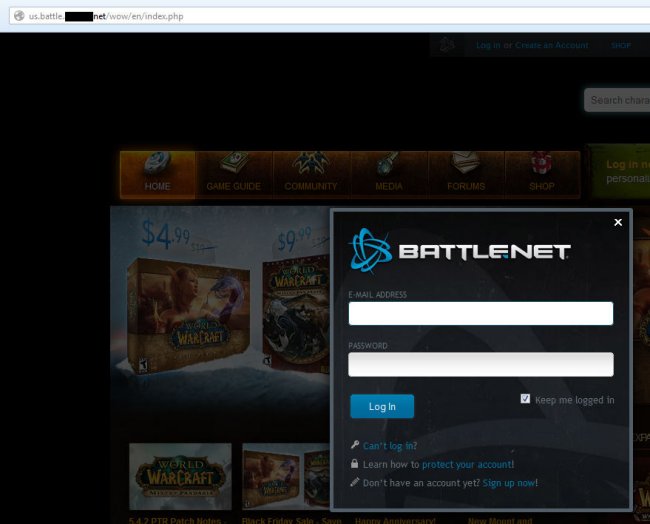Battle.net gamers targeted in newest phishing scam
Posted by: Jon Ben-Mayor on 05/31/2014 07:55 AM
[
 Comments
]
Comments
]
The newest phishing scam making the rounds is simple and clever all at the same time; this one directs itself at gamers using the Battle.net (Blizzard Enterainment) gaming service, which includes popular titles such as: Diablo, StarCraft, Warcraft II: Battle.net Edition, Diablo II, Warcraft III, World of Warcraft, StarCraft II: Wings of Liberty and Diablo III. The scam accuses users of cheating and then requires them to enter login information, preying on human nature - the trait of defending oneself against any accusation of any impropriety, whether or not it is true or false.
Violates our policies for Battle.net
Dear customer,
Because you are involved in the trading of gold and equipment, legitimately means playing with an unaltered game client. Doing otherwise violates our policies for Battle.net, and it goes against the spirit of fair play that all of our games are based on. We strongly recommend that you avoid using any hacks, cheats, bots, or exploits. Suspensions and bans of players that have used or start using cheats and hacks.
You can confirm that you are the original owner of the account to this secure website with:
Login to your account, In accordance following template to verify your account.
* Account Name and Password
* Secret Question and Answer
Show * Please enter the correct information
If you ignore this mail your account can and will be closed permanently.
If you wish to review our current Rules and Policies for World of Warcraft and Battle.net, they can be found at:
For further security tips, please visit:
Regards,
Customer Services
Account Administration Team
Blizzard Entertainment

Malwarebytes goes on to explain in further detail, clicking any of the three links in the email will lead users to an imitation Battle.net URL.

The website asks for username / password, and also the answer to a user selected security question.
The email is written in such a way that it attempts to make the recipient feel the need to defend themselves against being implicated in such an unsavory endeavor that cheating is. The scam will undoubtedly snag even gamers that are not involved in cheating, or as Malwarebytes, Christopher Boyd puts it, innocent gamers will potentially panic when seeing it in their inbox, and end up getting themselves phished too.
Should you receive a mail about cheating in games, keep a calm head and avoid handing over any logins or personal information. Scammers know that a little bit of panic goes a long way where convincing end-users to jump through some neatly arranged hoops is concerned.
Violates our policies for Battle.net
Dear customer,
Because you are involved in the trading of gold and equipment, legitimately means playing with an unaltered game client. Doing otherwise violates our policies for Battle.net, and it goes against the spirit of fair play that all of our games are based on. We strongly recommend that you avoid using any hacks, cheats, bots, or exploits. Suspensions and bans of players that have used or start using cheats and hacks.
You can confirm that you are the original owner of the account to this secure website with:
Login to your account, In accordance following template to verify your account.
* Account Name and Password
* Secret Question and Answer
Show * Please enter the correct information
If you ignore this mail your account can and will be closed permanently.
If you wish to review our current Rules and Policies for World of Warcraft and Battle.net, they can be found at:
For further security tips, please visit:
Regards,
Customer Services
Account Administration Team
Blizzard Entertainment

Malwarebytes goes on to explain in further detail, clicking any of the three links in the email will lead users to an imitation Battle.net URL.

The website asks for username / password, and also the answer to a user selected security question.
The email is written in such a way that it attempts to make the recipient feel the need to defend themselves against being implicated in such an unsavory endeavor that cheating is. The scam will undoubtedly snag even gamers that are not involved in cheating, or as Malwarebytes, Christopher Boyd puts it, innocent gamers will potentially panic when seeing it in their inbox, and end up getting themselves phished too.
Should you receive a mail about cheating in games, keep a calm head and avoid handing over any logins or personal information. Scammers know that a little bit of panic goes a long way where convincing end-users to jump through some neatly arranged hoops is concerned.
Comments






